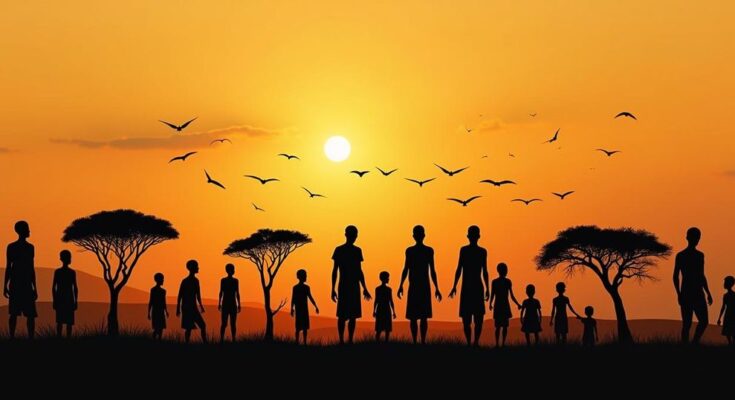Tanzanian communities are confronting deepening drought and climate change through a significant initiative led by the government and UNEP, providing solar-powered boreholes and sustainable practices training. This project enhances water accessibility for over 35,000 people while promoting economic resilience through diverse income-generating activities. The approach highlights the necessity for integrated climate strategies to support rural communities effectively.
In Tanzania, communities face increasing challenges due to climate change, particularly evident through persistent droughts that compromise their livelihoods. For Asherly William Hogo, a cattle farmer from the village of Ng’ambi in the Dodoma region, the pursuit of water was once a nightly endeavor, often requiring extensive treks across arid lands. However, recent developments have transformed this struggle; the village now benefits from a solar-powered borehole and a substantial rainwater reservoir, alleviating the burdens of water scarcity. Hogo reflects, “Now we don’t travel long distances like we used to.” This infrastructure initiative is part of a larger effort spearheaded by the Office of the Vice President of Tanzania and the United Nations Environment Programme (UNEP), aiming to assist rural Tanzanians grappling with the dire consequences of climate change. Funded by the Global Environment Facility since 2018, this initiative has improved water accessibility, enhanced community savings, and provided training in sustainable practices such as beekeeping. Mirey Atallah, Head of UNEP’s Adaptation and Resilience Branch, emphasized the urgency of the situation, stating, “This year is the biggest wakeup call we’ve seen in Tanzania in terms of what climate change is doing to rural families. We need fast action on mitigation and adaptation. Otherwise, it won’t only be the climate that is breaking down but also the communities themselves.” This project emerges during a critical period as Tanzania experiences severe disruptions to its weather patterns, which have resulted in crop failures and livestock losses due to drought, followed by intense flooding that caused widespread destruction. Amid such challenges, community-driven land use planning is crucial to prevent a downward spiral due to climate change impacts, particularly for villages reliant on rain-fed agriculture. Atallah argues that effective climate resilience strategies must be integrated, incorporating both infrastructural development and natural ecosystem restoration, stating, “We know that the best climate defences are integrated, holistic and multipronged, drawing not only on built infrastructure but also on the power of nature and ecosystems.” Since the project’s inception, significant strides have been made. Engineers have drilled 15 boreholes, established earthen dams that capture millions of cubic meters of rainwater, and have delivered clean water to over 35,000 individuals in five districts. Local residents, like Malegesi Makene Chilongo, have expressed gratitude for the newfound opportunities, stating, “We used to face many challenges growing vegetables.” Additionally, efforts to rehabilitate local ecosystems have been paramount, with over 350,000 trees planted to restore degraded areas and enhance groundwater replenishment. The initiative’s holistic approach not only aims to improve environmental health but also to facilitate economic resilience. Residents are being trained in diverse income-generating activities, such as beekeeping and mushroom cultivation, with the expectation that approximately 3,800 households will see improvements in their financial stability by the end of the project in December 2024. “By diversifying income sources, the project has provided a safety net against the volatility of climate change,” states Atallah. Tanzania’s Minister of State, Selemani Jafo, commended the efforts, asserting the project’s role in empowering communities economically. Similarly, participant May Samwel Masulu highlighted its impact on gender dynamics by enabling women to engage in traditionally male-dominated trades, proclaiming, “I’m so proud to be a craftswoman.” As the UNEP advances its mission to mitigate climate change in line with the Paris Agreement, this initiative exemplifies targeted efforts to support vulnerable communities like those in Tanzania, ensuring they are better equipped to adapt to the changing climate.
The article discusses the efforts being made in Tanzania to combat the impacts of climate change, particularly the increasing frequency and severity of droughts. It highlights the historical struggle for water access faced by rural communities and the transformative impact of recent infrastructure developments that provide sustainable water sources. The narrative illustrates a collaborative project involving the Tanzanian government, UNEP, and the Global Environment Facility, focusing on community adaptation strategies to enhance resilience against climate-related adversities. The article emphasizes the need for immediate action to address the intertwined challenges of climate change and rural poverty.
In summary, Tanzanian communities are actively seeking solutions to the challenges posed by climate change, particularly the devastating impact of droughts. Through collaborative projects that enhance water access and promote sustainable practices, local residents are gradually building resilience against climate fluctuations. The initiative not only provides essential resources but also fosters economic diversification and gender equality, reflecting a comprehensive approach to adaptation and sustainability. As the project progresses, it stands as a testament to the effectiveness of integrated climate strategies in empowering vulnerable populations.
Original Source: www.unep.org




